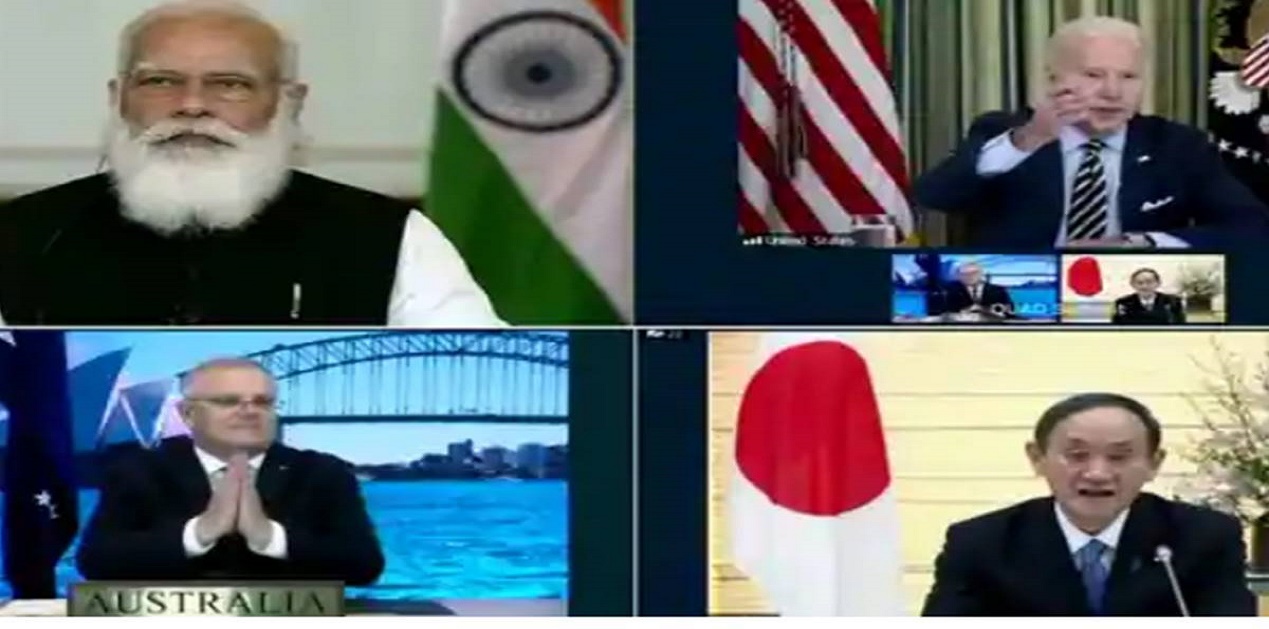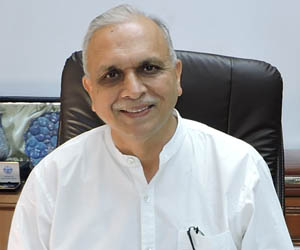The historic leadership summit of the Quad counties held on 12th March 2021 was a milestone in the evolution of the Quadrilateral Security Dialogue which was set up back in 2007 and revived in 2017. Hosted by US President Joe Biden, Indian Prime Minister Modi, Australian Prime Minister Scott Morrison and the Japanese Prime Minister Yoshihide Suga participated in the summit in a virtual format. The leaders issued a joint statement that laid down the principles and objectives of the Quad.
Titled the “Spirit of Quad”, the joint statement outlines the “shared vision” of the Indo-Pacific “that is free, open, inclusive, healthy, anchored by democratic values, and unconstrained by coercion.”1 The Quad envisages a “free, open, rules-based order, rooted in international law to advance security and prosperity and counter threats both in the Indo-Pacific and beyond.”2 The leaders committed themselves to “support the rule of law, freedom of navigation and overflight, peaceful resolution of disputes, democratic values, and territorial integrity.”3 These could be regarded as the underlying principles of the Quad.
The decision to hold the Quad summit came soon after the Foreign Minister level meeting held in February. This was the first multilateral meeting convened by US President Biden after he took over in January. The reiteration of US commitment to Quad shows that the Biden Administration in forging new partnerships in the Indo-Pacific region. It also shows that the Indo-Pacific concept is here to stay.
The leaders were careful to address the ASEAN’s long-standing skepticism about the Indo-Pacific construct and the Quad. To reassure ASEAN, who feel the heat of US-China rivalry, the leaders explicitly expressed their “strong support for ASEAN’s unity and centrality as well as the ASEAN Outlook on the Indo-Pacific.”
The kernel of the Quad cooperation had emerged during the 2004 Indian Ocean tsunami disaster when the navies of the US, India, Japan, and Australia came tother in an impromptu manner to provide timely relief to the affected countries. In the contemporary context, the leaders have underlined the importance of cooperation to deal with global challenges such as Covid-19, climate change and new technologies. The keenness to tackle contemporary global challenges would cement the Quad grouping.
The underlying logic of the Quad has been security cooperation although there have been attempts not to highlight it too much. Security has been given a wider interpretation by the leaders. It includes cooperation in “cyberspace, critical technologies, counter terrorism, quality infrastructure investment, and humanitarian-assistance and disaster-relief as well as maritime domains.” A careful reading of the joint statement shows that hard security cooperation remains a part of the Quad deliberations.
Given the rising geopolitical and economic importance of the Indo- Pacific, several European countries, particularly, France, the UK and Germany have come up with respective policy statements about their intent to deepen engagement with the region. Bearing this in mind, the leaders envisaged cooperation with a “range of actors to promote the objectives of free and open Indo Pacific.” Thus, a Quad plus dialogue and cooperation in the future is not ruled out.
In a smart move, the Quad leaders did not neglect the practical aspects of cooperation. They have set up three working groups, on the Covid-19 vaccine, critical and emerging technologies and climate change respectively. These working groups will come up with practical ideas to innovate, produce and distribute the Covid-19 vaccine; cooperate on standards and innovative technologies of the future, and strengthen climate mitigation, adaptation, resilience, technology, capacity building and financing. Such cooperation is designed to enhance the Quad’s appeal to the countries of the region. India, which has emerged as the key country in the global production of vaccines, would greatly benefit from such cooperation.
The Quad countries have decided to launch a unique vaccine cooperation programme meant for the countries in the Indo-Pacific region. According to a fact sheet issued by the White House, the United States will provide finance with a Hyderabad based company Biological E Ltd. to produce at least 1 billion doses of Covid-19 vaccines by the end of 2022; Japan will provide concessional yen loans to the Government of India to expand manufacturing for Covid-19 vaccines for export; Australia will contribute US$77 million for distribution of vaccines with a focus on Southeast Asia.4 This is a win-win situation for all. If successful, the model can be replicated in other areas to generate significant economic, commercial, technological and social benefits.
The Quad is being positioned as a benign grouping, not against any country, yet focussed on free and open Indo-Pacific and rule-based order.
Prime Minister Modi, in his opening remarks, described the Quad as a meeting of “friends” highlighting that their combined efforts would be a force for ‘global good’ in the spirit of the ancient Indian cultural message of Vasudhaiva Kutumbakam, or the world is a family. Interestingly, the Australian Prime Minister greeted the participants with a traditional Indian greeting of Namaste, with folded hands.
Although the Quad has got a boost from the leaders’ summit, its further evolution will depend upon China’s reaction and ASEAN’s receptivity. China is concerned about four big economies and military powers coming together to undermine its rise. A Global Times editorial written on the eve of the leaders'summit had warned that the attempt to replicate ‘NATO in Asia’ will not succeed. Nevertheless, China would be worried about the rapid consolidation of the Quad.
Each member country has a complex relationship with China. India is negotiating troop disengagement with China on the Line of Actual Control on its northern border. US and China are competing for economic and technological leadership. The top Chinese and US officials are meeting shortly in Alaska to figure out the China-US relationship which had touched the nadir during Trump's term. Australia is under severe economic pressure from China. Japan faces Chinese onslaught daily in the East China Sea and yet it has a deep economic relationship with the country. The further evolution of the Quad will depend upon China’s countermove, the Quad’s ability to deliver on its promises and its acceptance by other countries of the region.
The Quad will also need to distinguish itself from the groupings like G7 or G20 which also deal with global problems. Their statements are mostly rhetoric lacking tangible benefits to the members. The Quad has the advantage that it is smaller and can be more nimble and can deliver faster and better. It is focussing on practical outcomes.
It cannot be denied that the raison d’etre of the Quad is linked with China’s rise in the region and its unilateralist and expansionist tendencies. The Quad may very well harbour a global governance model in the post-Covid world in which China is trying to emerge as an unfettered, unrestrained superpower. While the Quad is unlikely to be a formal NATO-like security alliance bound by a treaty, it will have both hard as well as soft components which can be used flexibly. Its capacity to identify problems and cooperate to mitigate global challenges in the interest of the wider circle of nations will be the key determiner of its future revolution.
India believes in an inclusive Indo-Pacific construct, as enunciated by Prime Minister Modi at Shangri-La in 2018. India is taking this belief into the Quad. It does not wish to confront China directly. Yet, faced with growing Chinese pressure, it is shedding its hesitation to join other democratic countries to deal with resurgent China. India is attempting to remain relevant in the Shanghai Cooperation Organisation, BRICS and the Quad at the same time. This would be a challenge if the chasm between Russia and China on one hand and the US and the west deepens in the post-Covid world.
More summit and ministerial and official level meetings are envisaged in the future. This may lead to its institutionalisation. These are the early days. The leadership summit has consolidated the Quad and lent some clarity to the vision of the free and open Indo-Pacific. On account of China’s scepticism, it will be a long haul towards establishing a rule-based order acceptable to all countries in the region.
Endnotes
- https://www.whitehouse.gov/briefing-room/statements-releases/2021/03/12/Quad-leaders-joint-statement-the-spirit-of-the-Quad/
- Ibid.
- Ibid.
- https://www.whitehouse.gov/briefing-room/statements-releases/2021/03/12/fact-sheet-quad-summit/
(The paper is the author’s individual scholastic articulation. The author certifies that the article/paper is original in content, unpublished and it has not been submitted for publication/web upload elsewhere, and that the facts and figures quoted are duly referenced, as needed, and are believed to be correct). (The paper does not necessarily represent the organisational stance... More >>
Image Source: https://images.financialexpress.com/2021/03/quad-1.jpg











Post new comment